Markets
When designing a humanitarian intervention and deciding whether to use CVA, a market analysis should be part of the overall response analysis. Supporting markets to function well has been shown to lead to faster recovery and increased resilience in disaster affected areas.
Many organizations have invested in the development of tools to support market analysis and are considering market-based programming more holistically. This includes interventions that use the market (such as cash transfers to affected populations), as well as interventions that directly support markets (such as conditional grants to traders to get their market back up and running).
Related initiatives
Featured content

Introduction to Market Analysis
Course
This 30 minute online course provides an introduction to the analysis of markets in emergency contexts, with input from some of the world’s leading thinkers on the topic.

A Practical Guide to Market Analysis in Humanitarian response
Course
A three to four hour online course designed to provide future humanitarian market assessment team members with a solid understanding of theory and steps of market assessments so that they can join assessment teams prepared with a basic understanding of what they will be doing and why.
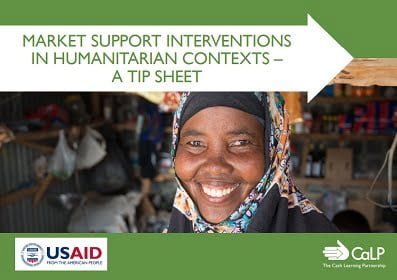
Market Support Interventions in Humanitarian Contexts – a Tip Sheet
Guidelines and Tools
This tip sheet defines what market support programming in humanitarian contexts is, and what it can look like in practice. It enables humanitarian practitioners to systematically consider market support interventions alongside other programme activities. The scope includes support interventions focusing on supply/availability and on demand/access. The tip sheet is based on secondary data...

Market Based Programming (MBP)
Guidelines and Tools
Market Based Programming (MBP) in Oxfam’s work means we always consider existing markets – through assessments, analysis and programming – across all phases of a response and across all technical sectors. You can also watch the videos below which are available in English, Spanish, Arabic and French.
Thematic lead
Latest
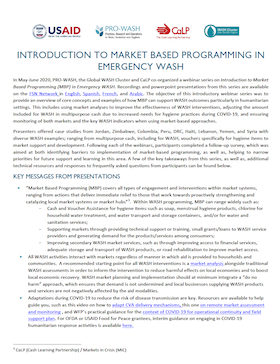
Introduction to Market based Programming in Emergency Wash
Guidelines and Tools
In May-June 2020, PRO-WASH, the Global WASH Cluster and the CALP Network co-organised a webinar series on Introduction to Market-Based Programming (MBP) in Emergency WASH. Recordings and Powerpoint presentations from this series are available on the FSN Network in English, Spanish, French and Arabic....

COVID-19 impacts on Prices and Markets in Iraq
Report
The COVID-19 crisis in Iraq has caused severe economic disruptions in Iraq that will affect vulnerable households the most. The Cash Consortium for Iraq (CCI) has two streams of ongoing data collection on prices and markets, monitoring the retailer and the consumer perspective across five governorates....

CVA in COVID-19 Contexts: Guidance from the CALP Network
Guidelines and Tools
This is a summary of the key points from the many resources you shared on CVA and COVID through this document. This is a living document and we will continue to update this summary as new resources are added. The below is intended to help organisations understand and prepare for likely impacts of COVID-19...

Water, Markets, Cash and Drought Resilience in Somaliland
Report
This learning brief looks Cash to Access Water (CAW) in Somaliland. Water markets exist, and they exist everywhere. In Somaliland, these markets are the ‘first responders’ to critical water needs during severe dry seasons and droughts. For decades, humanitarian agencies have been focusing on the use...

COVID-19: Invest now in cash/voucher-social protection scale-up or children pay the price later
Report
Read the article here. Only socially accountable Social Protection Assistance beyond humanitarian cash/voucher programmes – if properly and quickly implemented – will protect generations of children from the aftershocks of COVID-19. Despite cash and voucher transfers becoming the tool of choice of...

CVA & COVID-19: Remote Market Assessment and Monitoring
Blog Post
As field practitioners adapt their programmes to COVID-19, colleagues across our membership and Cash Working Groups are identifying multiple challenges. The CALP Network is working with others to develop a series of short, field-focused recommendations for such practitioners. The purpose of this series is...
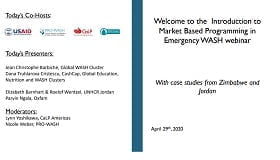
Introduction to Market Based Programming in Emergency WASH
Webinar recording
The recordings of webinar are available in English , Spanish, French, and Arabic. The webinar was co-hosted by the Global WASH Cluster, PRO-WASH and the CALP Network in May and June 2020. The webinar introduced how market based programming can be used in emergency WASH, provide an overview of...

Examples and Good Practices on the Use of Multi-Purpose Cash in the Food Security Sector
Guidelines and Tools
This global Food Security Cluster (gFSC) document was produced by the Cash and Markets Working Group (CMWG) to highlight the role and engagement of food security actors through different country experiences and good practices.
In recent years, multi-purpose cash (MPC) has been adopted more widely to...

Introduction to Market Based Programming in Emergency WASH
Webinar

External Evaluation of SDC/HA Emergency Cash Pilot For Earthquake Affected Households in Bubq, Albania
Report
In November 2019, Albania was hit by a large earthquake with a magnitude of 6.4, causing 51 people to lose their lives and injuring 913 people. Around 47,000 additional people were directly affected by the earthquake. The Swiss Agency for Development and Cooperation (SDC) immediately deployed a rapid...
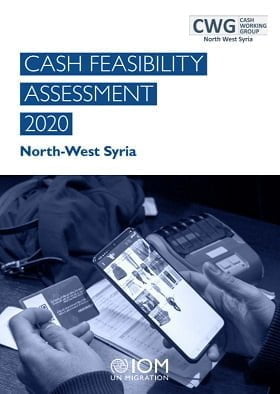
Cash Feasibility Assessment for NorthWest Syria
Report
The objective of this cash feasibility assessment for northwest Syria is to provide evidence-based, structured analysis of the various dimensions that make cash and vouchers interventions feasible. The primary audience for this document are all the organizations either currently involved in cash-based...

Statement on Likely Impacts of COVID-19 on Humanitarian Cash Transfers in Yemen
Report
The COVID-19 pandemic has now spread to the Middle East. Countries across the region are imposing measures to prevent further spread of the virus. Currently there are no confirmed cases in Yemen, but it is highly likely that COVID-19 will eventually reach the country. Organizations are shifting funding...
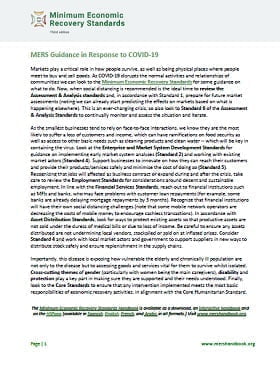
MERS Guidance in Response to COVID-19
Guidelines and Tools
Markets play a critical role in how people survive, as well as being physical places where people meet to buy and sell goods. As COVID-19 disrupts the normal activities and relationships of communities we can look to the Minimum Economic Recovery Standards for some guidance on what to do. Now, when social...
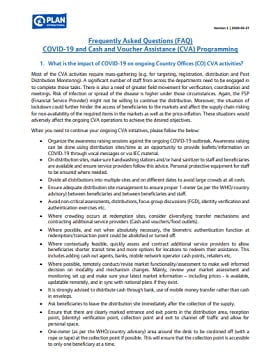
Frequently Asked Questions (FAQ) – COVID-19 and Cash and Voucher Assistance (CVA) Programming
Guidelines and Tools
This document has enlisted some key questions and their possible solutions in relation to COVID-19 response through cash and/or vouchers. This is a live document, which will be updated periodically.
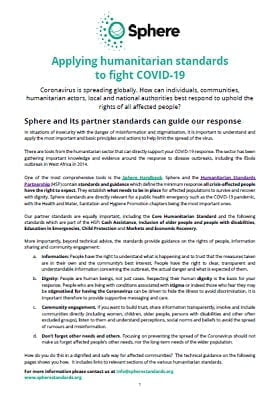
Sphere: Humanitarian Standards and Coronavirus 2020
Guidelines and Tools
Coronavirus is spreading globally. How can individuals, communities,
humanitarian actors, local and national authorities best respond to uphold the rights of all affected people?

ICRC Tipsheet: Cash and Voucher Assistance and COVID-19
Guidelines and Tools
This tipsheet serves as guidance to help field teams think through different ways:
1) to mitigate the spread of COVID-19 through ongoing Cash and Voucher Assistance (CVA);
2) inform the adaptation of CVA in the context of COVID-19;
3) promote sensitivity to evolving markets dynamics.
This tipsheet is...
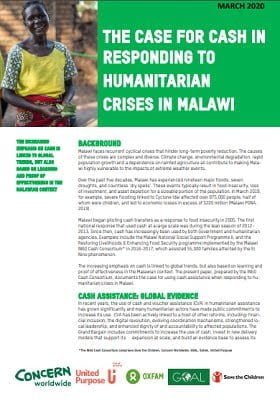
The Case for Cash in Responding to Humanitarian Crises in Malawi
Policy paper
A policy paper by the Malawi INGO Cash Consortium which makes the case for cash assistance as a response modality to humanitarian crises. It gives a brief overview of global evidence for cash and previous cash experience in Malawi, and makes several key recommendations. One of these key recommendations is...

Market Based Programming (MBP)
Guidelines and Tools
Market Based Programming (MBP) in Oxfam’s work means we always consider existing markets – through assessments, analysis and programming – across all phases of a response and across all technical sectors. You can also watch the videos below which are available in English, Spanish, Arabic and...
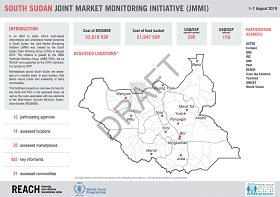
South Sudan Joint Market Monitoring Initiative (JMMI)
Report
In an effort to better inform cash-based interventions and understand market dynamics in South Sudan, the Joint Market Monitoring Initiative (JMMI) was created by the South Sudan Cash Working Group (CWG) in August 2019. The initiative is guided by the JMMI Technical Working Group (JMMI-TWG), led by REACH...
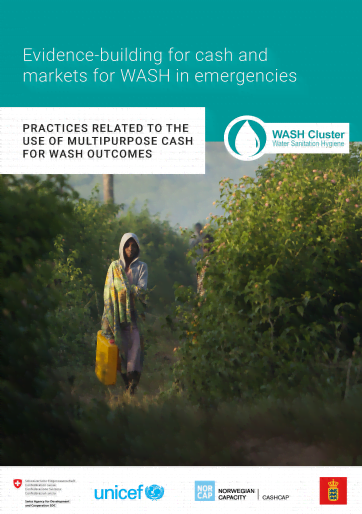
Evidence-building for Cash and Markets for WASH in Emergencies: Practices related to the use of multipurpose cash for WASH outcomes
Report
This report aims specifically to: present current practices (and practice gaps) of the use of MPC for WASH outcomes in emergencies, identifying the contexts and conditions under which MPC is used and highlighting lessons learned in contexts where humanitarian actors use MPC as a tool to meet basic needs,...



